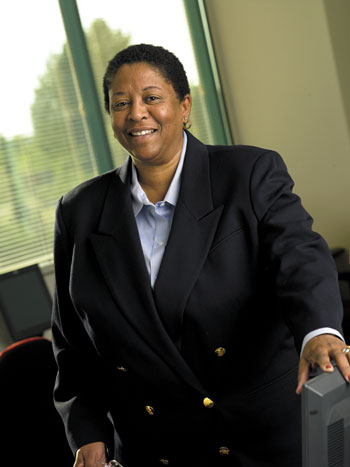| Defining the brand | Advertising the brand | Living the brand |
| Home Forethought President's Message Campus Buzz Feature Stories Re:Search The Score Alum News Yesteryear | ||
 Penny Willrich defies the law of averages.
Penny Willrich defies the law of averages.
A maverick almost by definition, she has blazed her own path since childhood, a trail that led to a seat on the Arizona Superior Court, where she was the first African-American woman to serve in that capacity.
The oldest of seven children, Willrich grew up in Grand Prairie in the 1960s during a time of extremely low expectations for African Americans and women. She attended segregated schools until the fifth grade.
“It was shameful the way the African-American children were treated,” she says, “both in failing to provide equal access to educational resources in the segregated schools and in failing to recognize their potential once schools were integrated.”
But Willrich didn’t let her background determine her destiny. She even overruled the discouraging advice offered by a high school counselor.
“I have always been a fast typist. My counselor advised me to go to business school to become a secretary—even though I was already admitted as a student at UTA, and despite having a fairly high grade-point average.”
Instead, Willrich enrolled at UT Arlington, eventually earning bachelor’s degrees in political science and history. She would be named Outstanding African American Alumna in 1999.
“When I graduated with my degree in political science, I was 19 years old and still eligible to play basketball for UTA,” she said. “So rather than go to law school at that time, I decided to seek a degree in history and continue to play basketball, continue with my involvement in student activities. I love the study of politics and the study of history. The combination of the two degrees has helped me tremendously in my work over the past 30 years.”
During her college days, she noticed that although African Americans made up a significant part of the student population, they were underrepresented in student government. Once again, she became an agent for change.
“I wanted to be at the table to help make decisions. As a result of becoming a representative from the College of Liberal Arts, I met such a diverse group of people that I wanted to continue. I ran for vice president. Won. And president. Won. The experience as a representative of the student body assisted me in developing values and goals and provided tremendous life skills.
“UTA was a wonderful place for me to obtain my education. Some of my fondest memories were having weekly meetings with President Nedderman and having role models like Allan Saxe and Professor (Luther) Hagard.”
Dr. Saxe remembers Willrich well, and he knew she would achieve great things.
“She was a marvelous student, active in campus activities, but always placing her academic studies No. 1,” he said. “It was not surprising to find out that she became a judge on the same court where former U.S. Supreme Court Justice Sandra Day O’Connor once served. What a credit and legacy to UTA are created by Judge Willrich. I will brag about her forever.”
Willrich became interested in a legal career as a child, inspired by great leaders and jurists such as Thurgood Marshall, Charles Hamilton Houston and Barbara Jordan.
“I see the law as an instrument of change and protection,” she said.
After earning her juris doctorate from Antioch School of Law in 1982, she began her career with West Texas Legal Services in Fort Worth. Her areas of expertise include criminal, family, probate, small business, entertainment and juvenile law. But her passion was working with children in the juvenile court.
One of Willrich’s recent efforts involves founding the Arizona Youth Innocence Project, an organization dedicated to addressing “the overrepresentation of kids of color in the Arizona juvenile justice and criminal justice systems, and to representing children in appellate actions.”
Since retiring from the bench last year, Willrich has also become more involved with the Phoenix International School of Law, Arizona’s first private law school (“we have four judges on staff—that’s unusual for any law school”). She’s director of lawyering process and an associate professor.
The move into academia would have pleased Willrich’s parents, who wanted her to become a mathematics teacher.
“Though I’m not teaching math,” she said, “by teaching law I am fulfilling their dreams.”
— Sherry W. Neaves
| Archives
| Alumni Association |
Giving to UT Arlington | UT
Arlington Home Copyright © 2006 UT Arlington Magazine. All rights reserved. |
